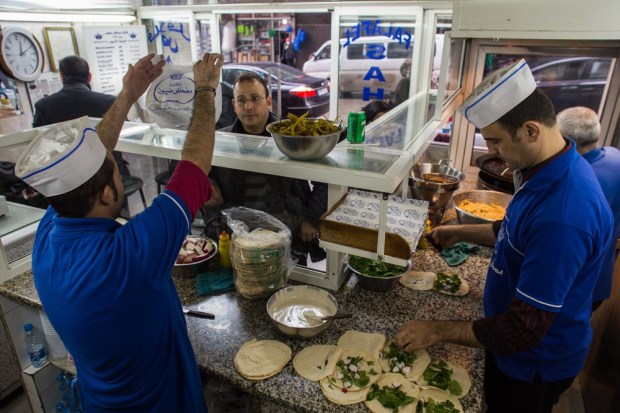Some afternoons, when his uncle Zouhair was unable to open shop, Mustapha Sahyoun’s father, Fouad, drove him to work in a bulky Peugeot 304 that bounced across roads pockmarked with bullet holes and rocket craters. But in the no man’s land between East and West Beirut, debris from demolished buildings often made the roads impassable, and Mustapha would have to go on foot. He would leave the Peugeot’s comfort and pick his way through an abandoned, dusty path running across the Green Line, a long stretch of ruined properties that served as the only buffer zone between Lebanon’s Christian and Muslim factions during the war that lasted from 1975 to 1990.
Mustapha had a pass, allowing him to go through the checkpoint in Beirut’s Mathaf neighborhood and hail a taxi, which then took him the rest of the way to his falafel shop, Zouhair’s, in Christian East Beirut. After navigating a broken city to get to work, Mustapha would spend the day mashing chickpeas and frying them into balls of crispy falafel, which he pressed into small pita sandwiches stuffed with fresh parsley, sliced tomato, chopped radish, and plenty of garlicky taratoor. It was important to his father and uncle, who owned separate shops in Beirut during the tumultuous 1970s and ’80s, that young Mustapha learn the craft of falafel the same way they did, one step at a time.
Fouad and Zouhair were devoted to each other. They saw the family business as a joint endeavor, even when operating separate shops. When the war split the two brothers between their different sides of Beirut, they still ventured the dangerous journey across no man’s land to help each other whenever possible. “I was everywhere” in Beirut, Zouhair says. “It was hard, but we had to make it work.”
Forty years later the distance and external conflicts that once kept Fouad and Zouhair apart are gone, yet other forces are dividing them again. They work meters from one another every day, preparing falafel the way their father taught them, but the brothers no longer speak. Instead of sharing a kitchen, Zouhair alone inhabits the original Damascus Street shop. One store over Fouad has a new shop, emblazoned with red signs that read “Falafel M. Sahyoun.” A single white-tile wall separates them; it’s a boundary that is never breached. Lebanon has long been a country defined by divisions. Though the brothers’ rift is not sectarian, the uneasy relationship between two falafel makers competing in close proximity mirrors the problems that continue to haunt the country.
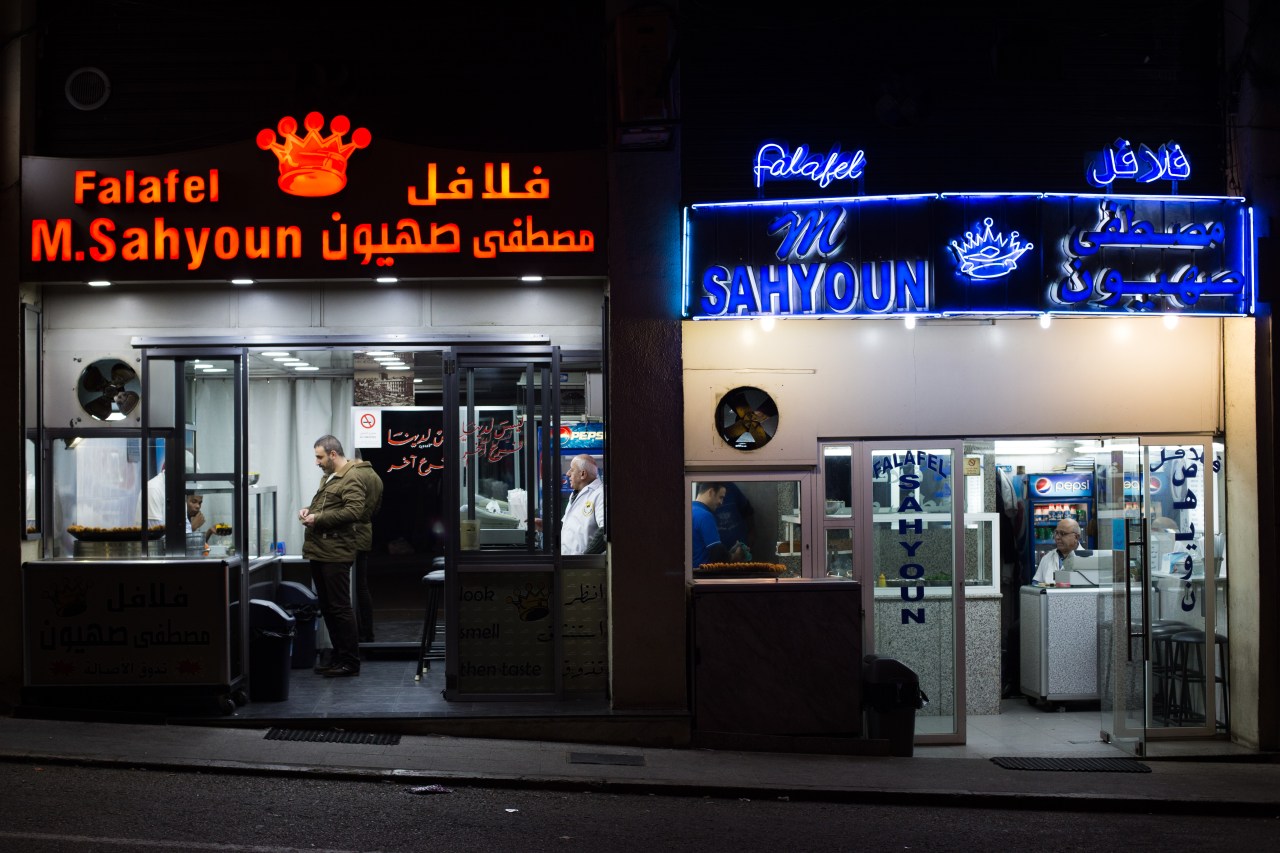
Fouad and Zouhair inherited the family business from their father, the first Mustapha Sahyoun, who opened one of Lebanon’s original falafel shops in a backstreet of Beirut’s downtown in 1933. A few years later, as Beirut expanded, he set up a larger storefront on Damascus Street. Over the next 20 years, falafel became more than just a business. Mustapha Sr.’s secret recipe was passed down to Fouad and Zouhair, two of his six sons, who still follow every step of his process.
Mustapha trained his sons by trial and error, after school and on weekends, making them watch as he prepared customers’ sandwiches and then quizzing the children afterward. He would taste and smell their creations, rating their quality and explaining ways to improve the flavor.
“He used to come and call me. I would go with him to the kitchen,” Zouhair says. “He would tell me, ‘Give me this, turn this on.’ My brother [Fouad] would do something different at the same time. From there, he would not tell me what to do, but he would tell me to get him something and take something else and slowly I memorized the process.”
For Fouad, ritual and repetition were key. “Little by little, I patiently learned until I could make a sandwich,” he says. “Once it clicks, you’re good.”
Once he was convinced of their mastery, only then did Mustapha Sr. allow Fouad and Zouhair to serve customers. The process took years. From the type of parsley purchased at the local market to the way a falafel sandwich is rolled, every stage is calculated and done for a reason. Now they work in neighboring shops that are mirror images of each other—one lit by a red-neon sign, one by a blue—sharing a name, a recipe, and a colorful family history of perseverance through the hardships of Lebanon’s violent past.
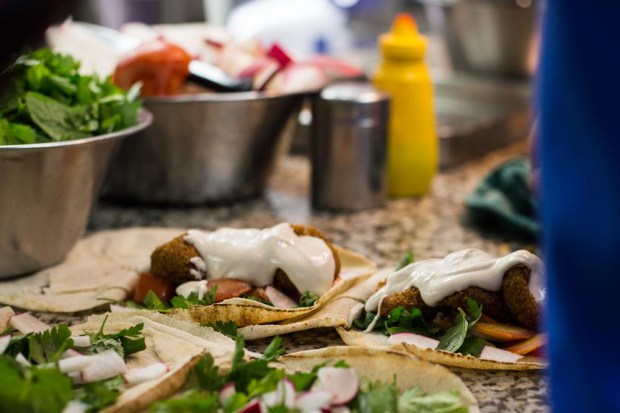
Falafel is a common food around the Middle East and the Mediterranean. It is said to have originated in Egypt, prepared by Coptic Christians during Lent as a substitute for meat. But, as anyone in Beirut will say, the Lebanese feel they have perfected the dish, and Sahyoun’s recipe is widely regarded as the best by locals and critics alike. (Anthony Bourdain visited both shops in 2010 for his show “No Reservations”). Departing from standard recipes, Mustapha Sr. famously used only beans and spices in his mix, eschewing the onions (he was concerned his customers would get bad breath) and parsley other chefs and cultures use. The result is falafel that’s crispy on the outside but moist and slightly mushy inside, a salty, rich contrast to the crisp radish, juicy tomato, and fresh parsley and mint surrounding it.
The Lebanese love affair with falafel is so deep that in 2010, despite internal political tension and economic malaise, Lebanese chefs came together and fried five tons of falafel in order to reclaim the record for “world’s largest amount of falafel” from the Israelis. Naturally, the chefs prepared the world’s largest hummus bowl the next day.
Falafel is a meal that transcends socioeconomic backgrounds. “There are people who say that the falafel is our hamburger,” Zouhair says. At the brothers’ shops, a sandwich sells for $2, ready to eat on the go or wrapped up in bags by the dozen. Important Lebanese politicians enter as casually as construction workers in stained coveralls, eating sandwiches outside or at the small marble countertops. Fouad and Zouhair both say that several former Lebanese presidents have sent bodyguards or drivers into their shops for bulk orders of sandwiches.

The Sahyoun family is Muslim, but their businesses are nondenominational. Even when the Lebanese Civil War was at its height, Falafel Mustapha Sahyoun sold sandwiches to every faction in the bloody sectarian conflict. But it wasn’t easy. Both brothers remember violent clashes outside their shop and the yells of men armed with Kalashnikovs.
“When there was a problem, the whole country would shut down,” Fouad says. “The next day you had to continue.”
The Green Line separated Muslims from Christians, so Falafel Mustapha Sahyoun was directly in the middle of the war. Clashes erupted at random times of the day, scaring off customers. In 1977, Mustapha Sr. died. Then, when the assassination of a prominent Christian politician intensified the conflict, the brothers were forced to close the Damascus Street shop.
As the city tore itself apart, Fouad and Zouhair found themselves on opposite sides of the divide. Fouad lived in West Beirut, while Zouhair lived near his father’s house in East Beirut. Managing any business during the Civil War was a challenge, but the two brothers faced the impossible task of regularly commuting across the Green Line if they wanted to work together.
Eventually, Fouad decided to rent a storefront in West Beirut and build living accommodations on the next level, while Zouhair set up a falafel shop in East Beirut.
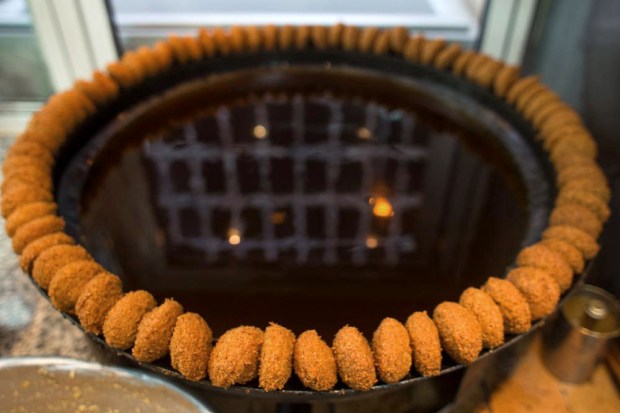
The war lasted for 15 years, and the brothers kept selling falafel throughout. Some nights, Fouad says, he would have to call his family and tell them he could not come home, because the battle was raging on the streets outside his shop. Instead, he would lock himself inside and sleep on the floor behind the heavy granite counters, praying for the violence to end. When the war finally ended in 1990, Falafel Mustapha Sahyoun had survived, and Fouad and Zouhair soon returned to Damascus Street. The shop was ruined from years of war, and the surrounding street was worse.
“It was all broken,” Fouad says. “We had to fix it, it took us a week. There was no road. Cars could not come on the road, so people would park on the backstreet and walk here.”
The brothers patched up the shop and started cooking. As Beirut put itself back together, their customers started to return. “Once our old customers knew we were here, they started to come, and they would tell other people,” Fouad says. “It took six to seven months to a year for everyone to know.”
Falafel Mustapha Sahyoun worked smoothly for the next 12 years until 2006, another violent year for the country. Though the Israeli invasion did not affect their business the same way the Civil War had, the year closed with an insurmountable rift between the two brothers. They were clashing over their ideas for the business’s future. Fouad left and opened the storefront directly next door to the original shop. He set up a competing restaurant with a red neon sign and the same menu, logo, and recipe.
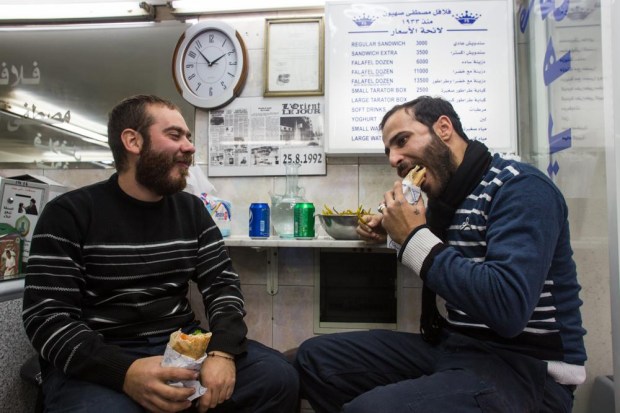
“We both began together,” Zouhair says. “We used to come down to the restaurant during those days my father ran the shop. When my father died, we continued to work together. At the end, he wanted to start something alone. He, by himself, decided this. I asked him to stay with me. It’s over between him and I.”
The brothers are both guarded about the rift in the family, but the bitterness lingers in the few meters of space between them.
“I don’t work for money. I work for my father’s name,” Fouad says. “Either you work for the name you have or work however you want to make money. I chose the name. He’s not my brother anymore. It’s over. It’s expired.”
Now, with no communication between the two brothers, customers are forced to choose between the two shops even though, by most accounts, the product is the same. Fouad’s shop offers the option of a spicy chili sauce, while Zouhair’s original, blue-signed shop uses only a tahini-based taratoor. Each has its regular customers. Few seem confused by the near-identical shops, instead heading immediately to where their loyalties lie.
The brothers sit behind their cash registers just meters away from each other, greeting their regulars and eyeing newcomers carefully to see which shop they enter.
Originally published on Roads & Kingdoms on January 13, 2016.
